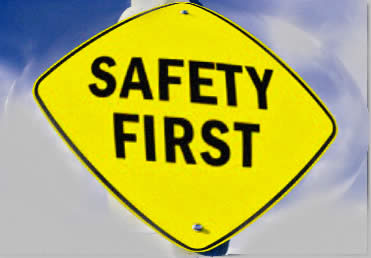Argentina is a bit of an outlier, on a continent often painted with a broad brush regarding safety concerns.
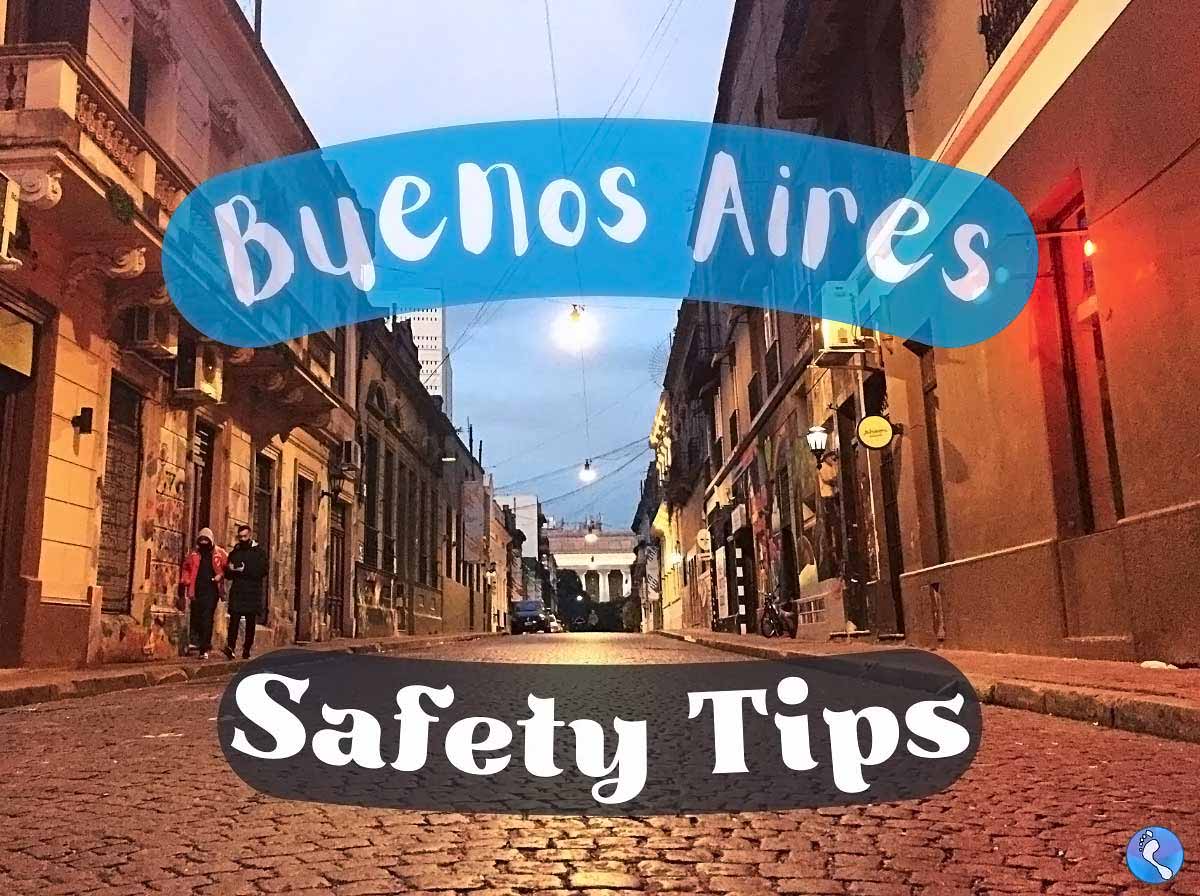
Along with neighboring Uruguay and Chile, there is less crime than in countries further north on the continent, such as Venezuela and Colombia.
Rates of homicide are often looked at as a good way to gauge violent crime.
In Argentina, the rate of homicide is 5 per 100,000 inhabitants, compared with 7.8 in the United States.
Argentina’s major cities and tourist destinations boast a relatively secure environment, but petty crime is a problem and visitors should still familiarize the common scams found in Buenos Aires (and sometimes other cities.)
Argentina’s relatively high safety speaks to a commitment to maintain public safety while respecting human rights and despite ongoing challenges posed by petty crime.
Crime in Buenos Aires
Buenos Aires is the capital city of Argentina and you’d think it would be the primary location for crime in Argentina, but it is not a particularly dangerous city as far as megacities go.
If you listen to the many residents of this port city or the excitable tabloid media you may come to believe it’s something akin to downtown Baghdad.
Safety in Buenos Aires is good according to the Crime Index Rate.
This year Buenos Aires is rated at number 45 on the World Crime Index for cities, falling immediately after Atlanta, Georgia (USA) and Birmingham, (U.K.).
Ten U.S. cities including Detroit, Albuquerque, and Chicago, are considered more dangerous than Buenos Aires.
When it comes to homicide, Buenos Aires is safer than most large U.S. cities.
In 2023 it has the fourth lowest homicide rate per 100,000 inhabitants among the 50 largest cities in the Americas. Only the three largest Canadian cities performed better.
As far as violent crime goes, Argentina is quite safe.
Crime Targetting Tourists in Argentina
But tourists are a target for crimes of opportunity and that’s why it is important to have situational awareness.
Statistics are likely skewed, however, by the fact that many people in Argentina don’t bother to report thefts to the police because they consider it a waste of time.
Petty theft is a problem in major cities, particularly Buenos Aires, but violent crime is less common than in many U.S. cities.
Incidents of armed robbery have increased in the last few years, such as those involving the ‘taxi mafia’ at Ezeiza airport but the chances are slim that a short-term visitor will be a victim.
The longer you stay in Buenos Aires, the more likely it is you will be a victim of crime, although that can also be offset as one becomes familiar with the city and blends in more.
Rosario
Rosario, the birthplace of one of Argentina’s most beloved figures, Lionel Messi, stands out as the only major Argentine city grappling with the challenges of narco-trafficking.
It holds the 14th spot on the World Crime Index, just a few positions behind Memphis, Tennessee, and is currently the sole Argentine locale flagged by the United States State Department with a, ‘Level 2: Exercise Increased Caution’ travel advisory.
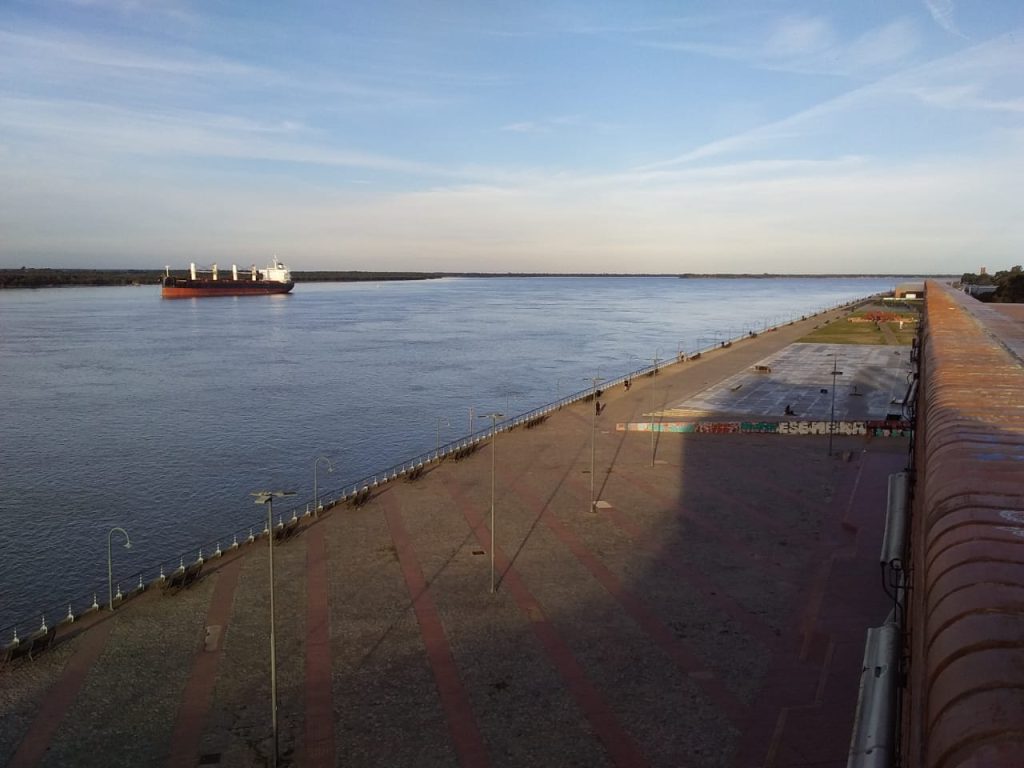
Despite these concerns, visitors can find solace in the fact that hotels are situated in secure neighborhoods, and locals are often willing to share insights on which areas to steer clear of.
Rosario boasts charming promenades that are perfect for leisurely strolls, though it’s advisable for those venturing beyond the well-trodden paths of the tourist zone to do so during daylight hours to ensure a safer experience.
Córdoba
Córdoba has recently ascended to become Argentina’s second-largest city, outpacing Rosario in population.
With this growth, it has also seen an uptick in urban crime, mirroring some of the issues prevalent in Buenos Aires, such as ‘motochorros‘ and petty theft on the streets.
Amidst the city’s burgeoning vibrancy, there’s a growing concern among its residents regarding an increase in homicides.
However, it’s worth noting that a significant portion of these violent incidents appears to be rooted in interpersonal conflicts, including disputes among feuding football (soccer) hooligans and familial disagreements, rather than random acts of violence.
Most Common Crimes in Argentina
The most common crime in Buenos Aires and around the country is petty theft, specifically pick-pocketing.
Petty Theft/ Pickpocketing
In Buenos Aires, pick-pocketing hot spots are Florida Street, around Plaza de Mayo, the area surrounding the Retiro train station, busy streets of Palermo, on the subway and buse.
Anywhere where there are crowds of people on the street, jostling from the crowd could be someone trying to reach into your bag or even slice it open with a razor.
Pickpocketing is the reason that visitors will notice locals carrying their backpacks in front of them like kangaroos.
One thing to be aware of is that the pick-pocketers are often women and are not always adults.
Although it has been seen less in recent years, sometimes children are sent out by their parents to beg around plazas and outdoor dining areas.
Snatch and Grab Robbery
The second most common crime is snatch-and-grab robbery — usually of cellphones but also purses and fancy watches.
Often the victim is using their phone on the street or on public transportation and someone comes up and grabs it and runs.
It happens quickly, and usually, the perpetrators manage to run through traffic or crowded areas to get away.
The obvious solution is to not use a phone much in public — visitors will notice that many travelers on the subway and buses simply read good old-fashioned books.
In the post, Safety For Female Travelers and What to Pack post, we recommend an over-the-shoulder type bag instead of a purse for women.
Street Vendors Selling & Maybe Stealing
It’s important to note there are legitimate ambulant sellers, such as those found on the Buenos Aires subway, who visit outdoor restaurants.
But sometimes street vendors may try to distract victims by placing something, such as their merchandise on the table as a diversion tactic to slyly snatch something like a cellphone.
They may just also dare to grab a camera, iPhone or purse sitting on a table and run away into the streets.
Motochorros/ Robbers on motorbikes
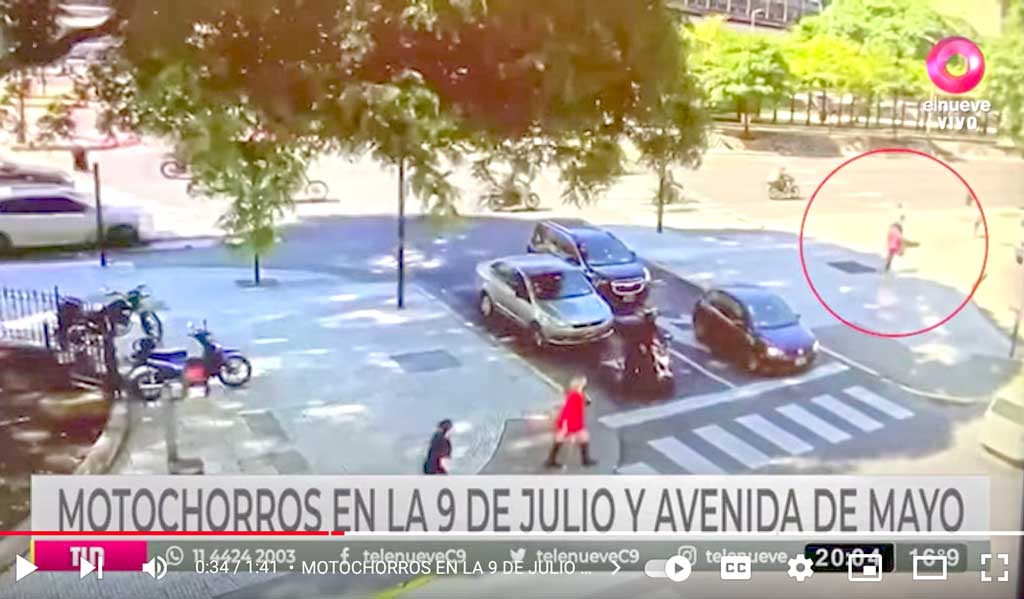
A common crime in Buenos Aires and Argentina overall is ‘motochorro‘ robberies.
‘Moto‘ means motorcycle and ‘chorro‘ means robber in Argentine slang.
Usually, motochorro robberies are conducted by two young men riding together.
Be aware if you see two men on a motorcycle slowing down, or riding near the sidewalk headed toward you, especially if one is not wearing a helmet, as required by law.
In the following video, you can see a tourist fight off a ‘motochorro’ after he jumped off the motorcycle to try and rob the traveler’s backpack.
The helmet law and increased stops of ‘double riders’ by police have reduced this crime in recent years in Buenos Aires.
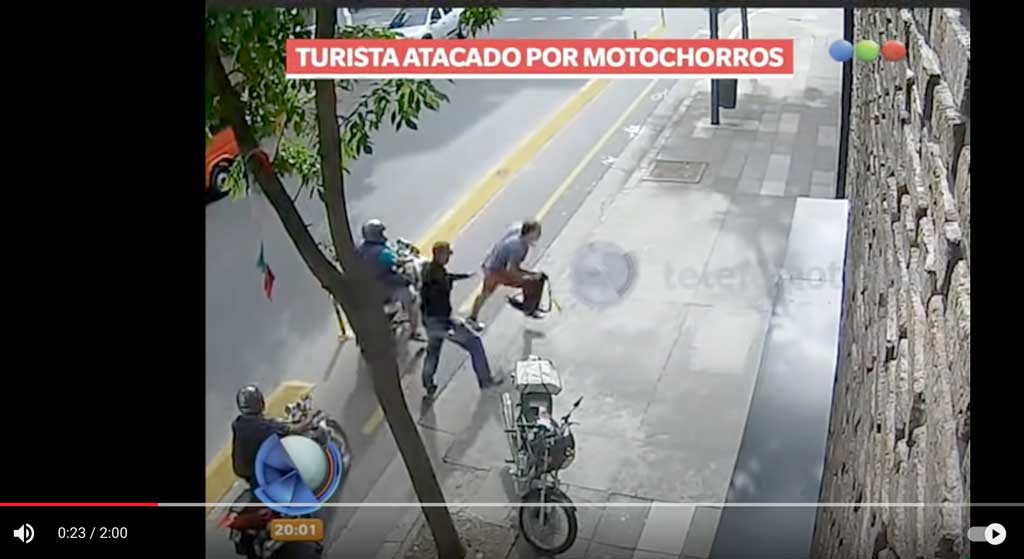
(video opens in a new window)
While the usual advice is to not resist and turn over whatever is asked for, there are quite a few stories in Buenos Aires of adrenaline-filled travelers fending off robberies.
One such case became a viral video in 2015.
An American from Chicago, Giancarlo Curioni, in one moment of inattentiveness, had his bag taken from the sidewalk outside of Aeroparque Jorge Newbery in Palermo, but in this case, the thief jumped into a waiting car.
Curioni ran and grabbed onto the side of the getaway car, which was trying to speed away.
While hanging onto the moving car, he got control of the steering wheel and caused it to crash.
In the aftermath, sent out on live TV, the thief was detained, while the American dripped blood from his arm while being interviewed.
Keep in mind, Curioni would not have been injured if he didn’t go after the thief, but he did get his bag back and was helped by the city’s special Tourist Police Department to get medical attention and reschedule his flight.
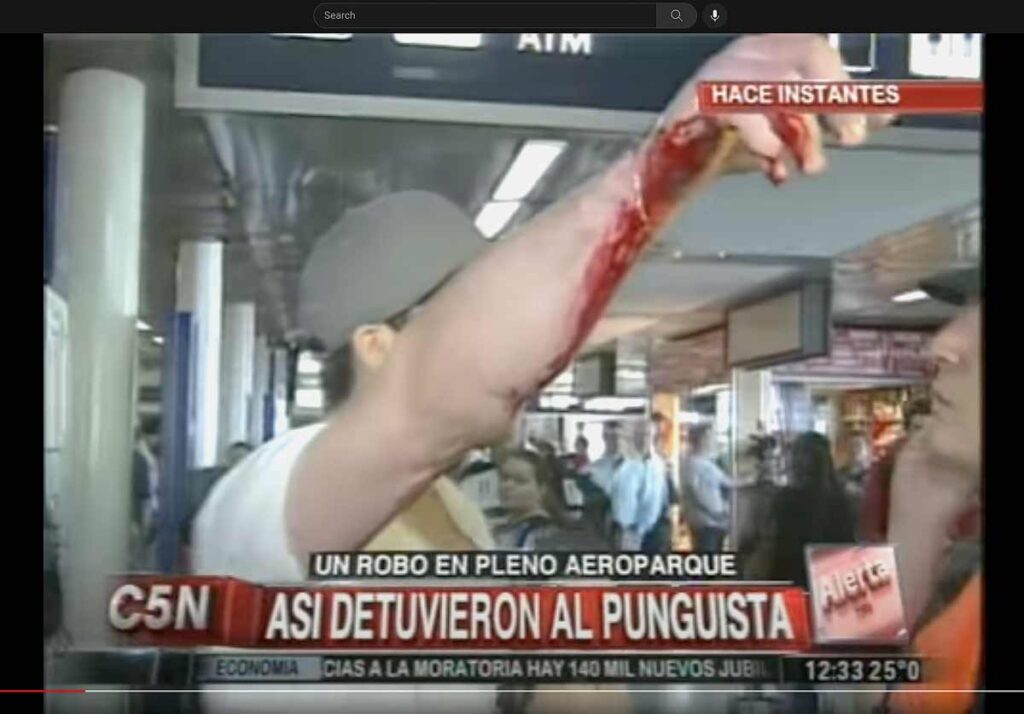
Argentina’s penal system is often accused of being soft on crime by residents but it is more likely for criminals to get jail time for injuring others in the course of a robbery.
In the vast majority of cases, if victims cooperate and hand over their items, they don’t get hurt.
Security inside Aeroparque and the international airport, Ezeiza is good.
Outside of the airports, travelers need to be more attentive to their luggage.
Piranha Robbery
A ‘piranha robbery’ or ‘robo piraña‘ refers to a robbery where a group mobs the victims.
It can be used to refer to the mugging of victims by a group, mobbing a store to steal items, or a group rushing an outdoor dining area and running off with bags or cellphones left on tables.
This tactic is more common in parts of Brazil, although it occasionally happens in Argentina.
Travel Safety Roundup
To ward off being a victim of crime in Buenos Aires is to be aware of the dangers that exist, as you would anywhere, and act accordingly.
Travelers in Argentina usually realize that they need to be careful, but when you’re having fun it’s easy to forget to pay attention.
When possible, try not to look like a foreigner.
Obviously, this is not always the easiest thing for a foreigner to do, but there are certain steps you can take.
In a country where approximately 44% of the population lives below the poverty line, and the local currency is valued at much less than the U.S. dollar or Euros, it is a sad fact that certain people view foreigners as nothing more than a potential source of money (kind of like walking ATMs with sunburns).
In travelers’ favor, Buenos Aires is a bit of a melting pot.
This means that if you are tall, blonde and blue-eyed, or Asian, or Black, you could still pass as a local here, or as someone from a neighboring country — not a ‘neo-colonist’ with wads full of cash.
Across the board, the chances that you will be a victim of crime depend more on your attire and conduct rather than just your physical appearance.
Check out what the locals are wearing and try to imitate them to a certain extent.
When you are walking around the city, for example, it may not be necessary to wear your Machu Pichu hiking gear and floppy hat when casual clothes and comfortable shoes would probably suffice.
As noted, in our post ‘Italian Echo in Argentina‘ Argentines tend to look toward Europe in fashion trends and dress in a more subdued style than in other Latin American countries.
If wandering into unfamiliar neighborhoods, try not to talk louder than is necessary in public, as speaking loudly in a foreign language is another way of drawing attention to yourself.
Resist the urge to shout at your wife in English that she is walking in the wrong direction when she is half a block in front of you.
Avoid looking lost. If you are lost, it’s a bit hard to pretend otherwise, but it’s best to advertise it as little as possible.
Standing on a street corner staring open-mouthed at an iPhone is a none-too-subtle hint to potential thieves that you are disoriented.
At least dip into a doorway or you can always head into a quiet bar for a coffee to check out your Google map.
If you get a sketchy feeling you can also just pop into a ‘kiosko’ (convenience store) which are on pretty much every block, and ask for directions.
Carry as few valuables with you as possible, and pay attention!
If you only have one small bag with your camera, money and credit cards, hold it close to your body when walking, and hug it to your belly while on crowded public transport.
Also keep your belongings on your lap or looped and tied around the chair when you are sitting in a cafe or restaurant (especially outdoors).
Because of Argentina’s mythical and persistent ‘Blue Dollar,’ foreigners are more likely to be carrying lots of cash, even if it’s just picking up a blue dollar money transfer.
Considering the cash-only economy, it may not be a bad idea to get a nifty money belt that holds money, credit cards and a passport.
The two items that are most appealing to Buenos Aires’ street criminals are professional cameras and cell phones — as mentioned above, they are often snatched out of their owner’s hands in the middle of the street, or even while sitting by an open window on a bus by someone running past, or riding by on a bike or motorcycle.
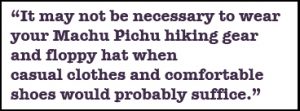
Pickpockets are especially adept at taking advantage of crowded public places – a moment of inattention and your wallet could vanish.
Barbara Bush (George W.’s daughter) kindly demonstrated this fact for us in 2007 when she somehow managed to have her bag snatched at a humble San Telmo cafe right in front of Plaza Dorrego, despite being accompanied by a posse of U.S. Secret Service agents.
(Apart from not keeping an eye on her bag, we can only allege she was also living up to her family name by breaking our next rule…)
Don’t get too inebriated! All of the points above are easier to comply with if you are sober.
Buenos Aires is a great city in which to party into the wee hours of the morning, but if you are going to do so (and it would be a shame to miss the nightlife) keep your wits about you, and don’t carry too many valuables.
Walk around with friends and if going home solo, consider getting a taxi or ride-share if you don’t feel comfortable walking home or taking a bus (most of which run all night in Buenos Aires).
The cash you need for the evening’s festivities, your phone, good recall of where you are staying, or a piece of paper with the address written on it (to show the taxi driver if you are too ‘tired and emotional’ to remember) are all you need.
Keep your bank/credit card in a separate place from your cash just to be cautious.
Once you say goodbye for the night make sure single friends arrive safely and if flying solo, let them know you got home safe and sound as well.
All of these points seem obvious, and apply to most places you travel to in the world, but are still often forgotten among all the merriment of being in Buenos Aires, one of the world’s most exciting cities.
While carjackings and other violent crimes might be less of a concern compared to places like Baltimore, Buenos Aires in particular demands caution against its nimble pickpockets and speedy ‘motochorros.’
Outside of the country’s capital, provincial violent crime rates are low.
Most visitors to Buenos Aires and the rest of Argentina never experience any kind of problem, but it pays to be just a tad paranoid, or at least remain cautious and attentive at all times.
Argentina Safety Round-Up
• Have situational awareness
• Only carry what you need for the day on you
• Don’t walk around with a DSLR camera around your neck in the city
• Don’t wear blink, such as a nice watch or jewerly
• Avoid looking lost and staring at your phone on the street
• Watch your bag closely on public transport and in restaurants
• Have a blast but don’t get so wasted that someone could take advantage of you!
It’s important to be aware of common street scams. ➡ See article
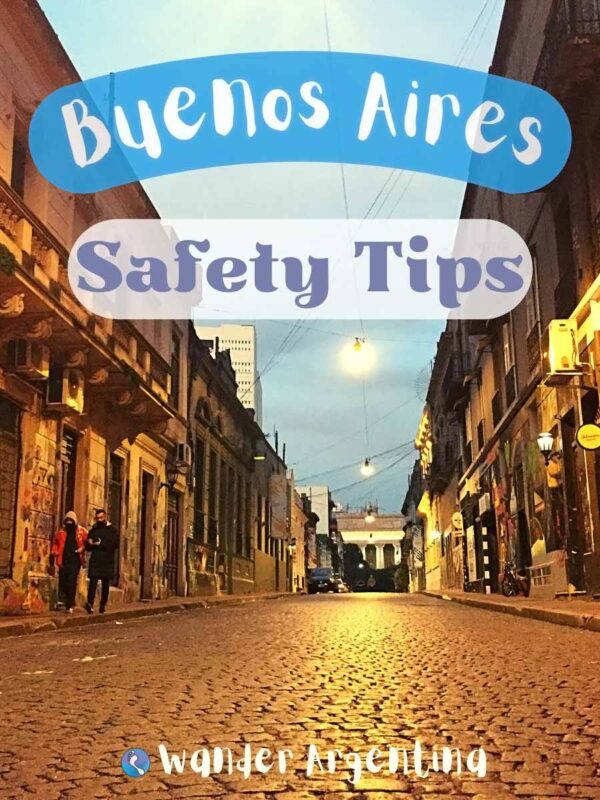
What to do if You Are a Victim of a Crime in Buenos Aires?
If you are a victim of a crime in Buenos Aires you can seek help from any police officer or call the national emergency number of 911 for an emergency.
You can also call 101 for a 24-hour English helpline.
If an ambulance or medical care is needed there is no charge, although let them know if you have travel safety insurance, as you may be taken to a private hospital.
The Buenos Aires Tourist Police is a special police department specifically designed to help visitors who fall victim to crime in Buenos Aires.
They can help you file a police report for insurance purposes and come through when there is a serious crime.
In the case of the action-hero American above, the tourist police accompanied him to the hospital and arranged a later flight out to go see his ailing grandfather in Córdoba.
The Tourist Police can offer help interpreting in English, Chinese, Portuguese, French, Ukrainian and Japanese and have a database of translators.
Buenos Aires Stolen Items Database
If you have a cell phone snatched, a locked-up bike disappeared or a laptop stolen, check the city’s online database of stolen items in police custody.
• Tourist Police (Comisaría del Turista) in Buenos Aires
Corrientes 436
Microcentro
Toll-free number: 0800-999-5000
Tel: (+54 9 11) – 5050 3293 / 9260
Email: [email protected]
See here for a list of locations of all police stations in Buenos Aires.

